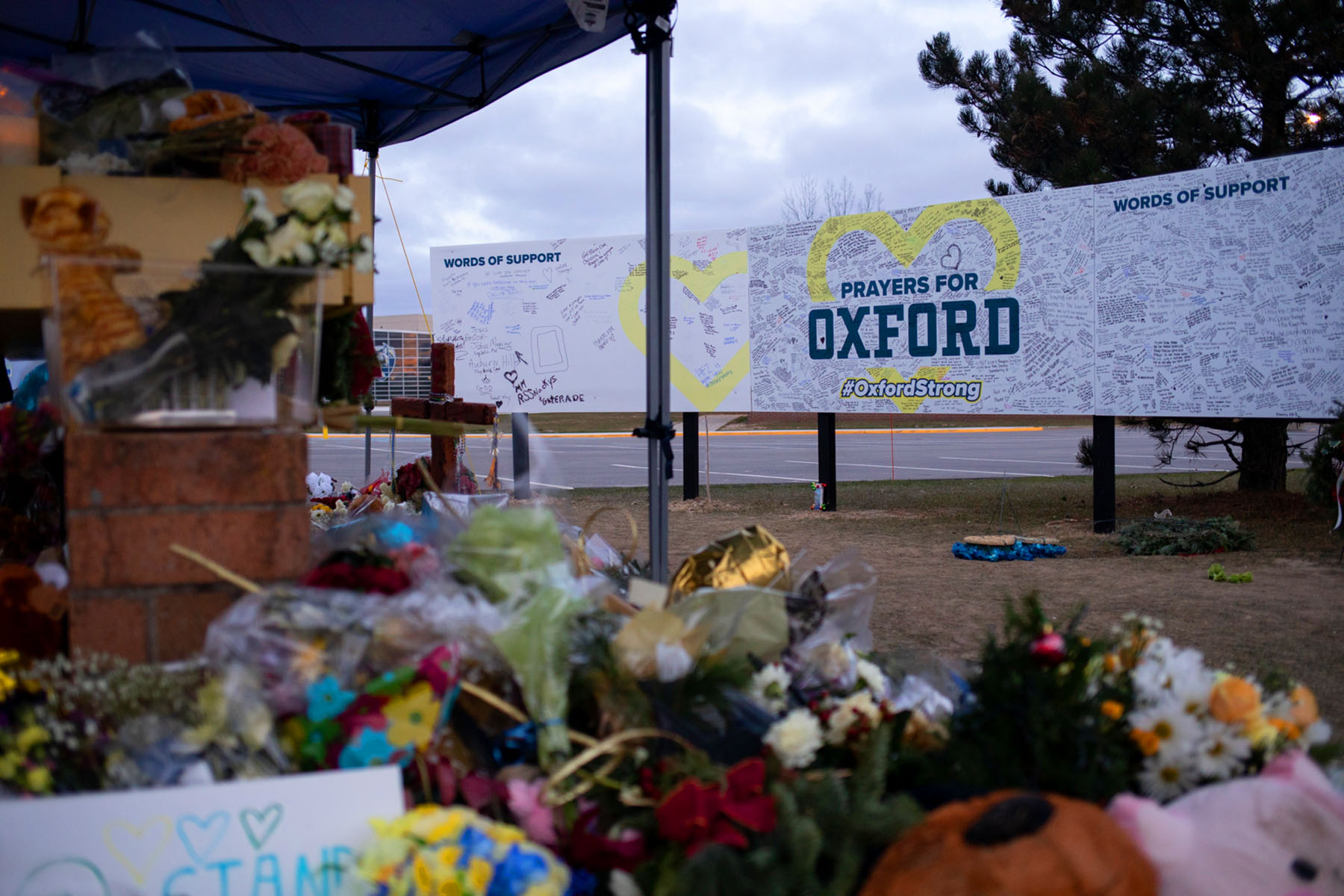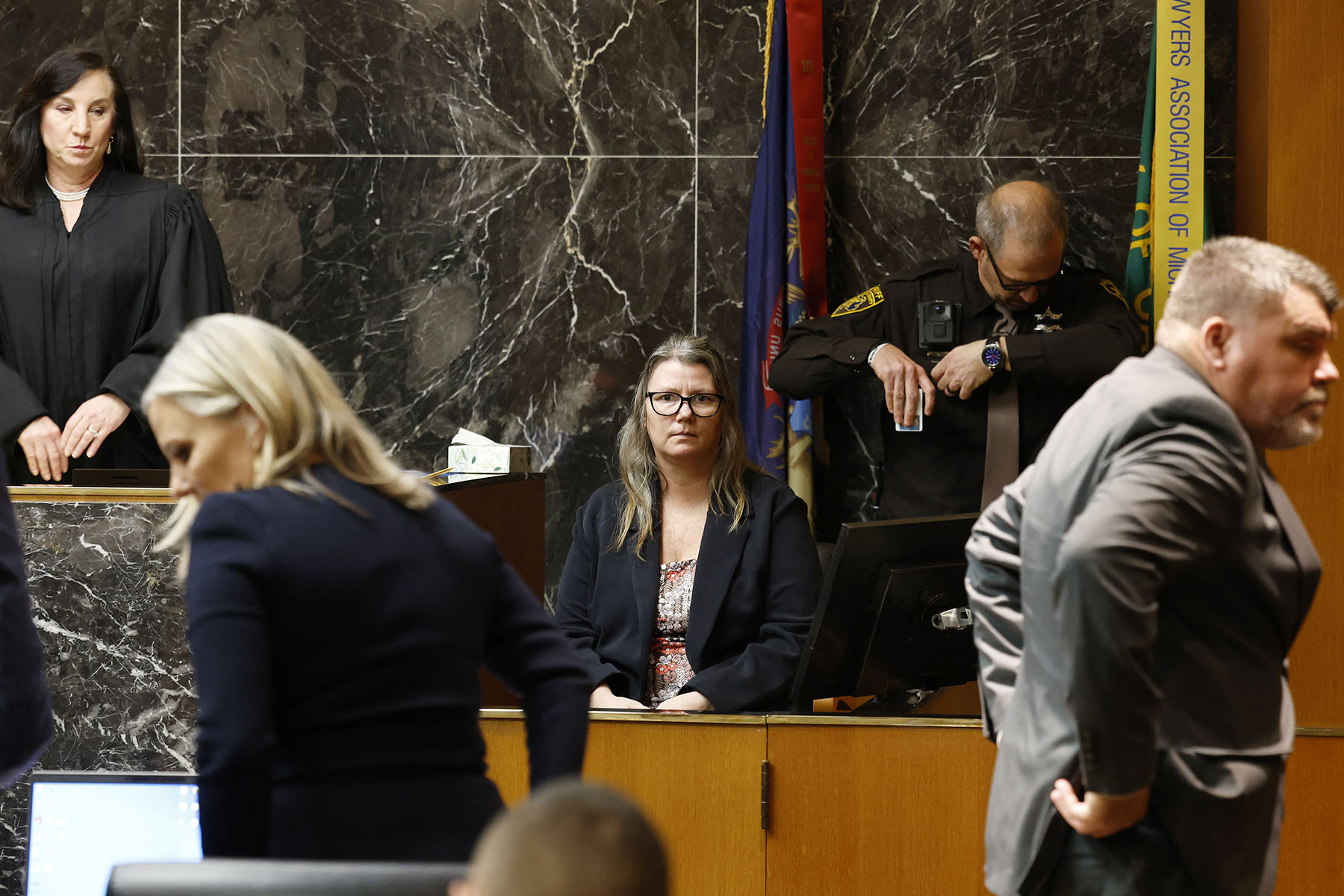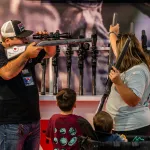Kris Brown felt the jury made the right decision — the only acceptable decision — in reaching a guilty verdict for Jennifer Crumbley, the mother of a teenager who killed four students in a Michigan school shooting. Crumbley was convicted last week of four counts of involuntary manslaughter in connection with the 2021 homicides.
“It would be crushing for the gun violence prevention movement in these factual circumstances not to get a conviction on all counts,” said Brown, president of Brady: United Against Gun Violence, a gun control advocacy group.
The prosecution characterized Crumbley as a negligent mother, arguing that she did not respond to multiple red flags about her son Ethan’s mental state, including a warning from school personnel on the day of the crime. Moreover, the prosecution pointed out that she did not safely secure the gun that he used in the mass shooting, which also caused nonfatal injuries to six students and one teacher at Oxford High School.
It is rare for parents to be charged, let alone tried and convicted, after their child commits a school shooting. Yet, the novel charges and conviction of Crumbley have been widely celebrated. The prosecution called her behavior before the shooting “egregious,” and many people took to social media, where Crumbley trended the day of the verdict, to share that view. Some legal experts and parents argue, though, that the case could lead to more charges against parents in connection with their children’s crimes, a trend they say could disproportionately affect racially and economically marginalized families.
Crumbley, who is White, is the second mother in recent months to face a court conviction over her child’s role in a school shooting. In November, Virginia mom Deja Taylor, who is Black, was sentenced to 21 months in prison after her 6-year-old son used her gun in a nonfatal shooting of his first-grade teacher early last year. Federal agents said there was no evidence that Taylor had ever safely stored the gun, and she faced up to 25 years in prison. Both Taylor and Crumbley were portrayed as bad moms outside of their children’s gun violence — including for consuming marijuana and having an extramarital affair, respectively.
When Oakland County Prosecutor Karen McDonald announced the novel charges against Jennifer and James Crumbley during a December 2021 press conference, McDonald, a parent of five, invoked her own motherhood while characterizing the couple as neglectful parents for not acting when school officials showed them a drawing by their son that alluded to gunfire and bloodshed. School personnel wanted the Crumbleys to take Ethan home, but they said they had to work and did not disclose that his father had purchased a gun for him.
“I am, by no means, saying that an active shooter situation should always result in a criminal prosecution against parents,” McDonald said. “But the facts of this case are so egregious — reading this document, looking at it, reading the words, ‘Help me’ with a gun, blood everywhere. This doesn’t just impact me as a prosecutor and a lawyer, it impacts me as a mother. The notion that a parent could read those words and know that their son had access to a deadly weapon that they gave him is unconscionable and I think criminal.”
Ethan’s father, James Crumbley, bought the gun for him as an early holiday gift, even though minors are prohibited from gun ownership. James Crumbley will be tried in March, while his wife will be sentenced in April and faces up to 60 years behind bars. Ethan Crumbley has already been sentenced to life in prison without parole.
W. David Ball, a professor at Santa Clara University School of Law, does not dispute that Jennifer Crumbley’s parenting was lacking. But what’s novel about the Crumbley case, he said, is that it indicates a mother can be held criminally liable for a child’s behavior because of her bad parenting.
“And I think the concern here is that typically when the criminal law is expanded, all of the sorts of inequities in society that we see expand right along with it,” Ball said.
Ball noted that the families subjected to child protective services investigations tend to be racially or economically marginalized —or both. Parents can be accused of child neglect because they live in substandard housing or are unhoused and living in their car, which isn’t a parenting issue but a poverty issue, he said.
“So what I worry might happen is that someone’s going to say, ‘Well, you did not parent your child, you didn’t control your child. Therefore, we’re going to make an example out of you,’” Ball said. “And the criminal law does tend to follow power, so it’s going to be people who are less proximate to power, so people of color and poor people, who are going to bear the brunt of this. Once this doctrine sort of gets out into the wild, anytime you expand it, there might be unforeseen consequences.”

Janelle Wood, the founder and CEO of the Black Mothers Forum, said that she did not initially consider the possible ramifications for other parents when she heard the Crumbley verdict. Based in Arizona, her organization advocates for schools to be safer and more inclusive of Black children and their families. It also fights against the criminalization of youth as a result of what is known as the school-to-prison pipeline, whereby punitive discipline policies push children out of school and make them vulnerable to entering the criminal justice system.
“It appears to me that this mother was aware that her son was in a bad mental health state,” Wood said. “It appears to me that she was a part of getting him that gun and making sure that he was able to fire that gun, and I do believe she definitely, as a mother, as a parent, did not do her due diligence to not only keep her baby safe but to keep other people around him safe.”
At the same time, Wood wonders what impact the case could have on other parents whose children commit crimes. After the Crumbley verdict, she learned that parents in her state are liable for their children’s willful or malicious misconduct resulting in injury or property damage. Her group has advocated for parents threatened with trespassing charges simply for requesting to speak with school administrators about disciplinary measures taken against their children, she said. She fears the Crumbley verdict will set a precedent that could ensnare Black parents.
“I am concerned because, oftentimes, there’s ways found to put us in situations where we are being penalized and criminalized for behavior versus breaking a law, and the two of those lines get blurred quite often when it comes to our children,” she said. “I agree that this [verdict] could become something that can be used against our children and our families and put them at an even greater risk of being in the school-to-prison pipeline, and now putting the parent in that pipeline as well.”
The Crumbley verdict has also drawn concerns because in 2021 Michigan did not have a safe storage law that required the Crumbleys to prevent their minor child or another unauthorized individual from accessing the weapon. A safe storage law will take effect in the state Tuesday. Although there was no such law at the time of the school shooting, the jury convicted Crumbley of involuntary manslaughter for failing to perform a parent’s “legal duty to exercise reasonable care to control their minor child so as to prevent the minor child from intentionally harming others or prevent the minor child from conducting themselves in a way that creates an unreasonable risk of bodily harm to others.”
Brown said that if every American safely stored their firearm, gun deaths would be cut in half. The Crumbley case sends an important message to gun-owner parents across the country, she said, adding that she would like to see gun manufacturers give away gun safes with every firearm purchase. But gun manufacturers don’t do that because they have no incentive to, she said. So the Crumbley case, she contends, sets a very important precedent for the standard of care.
The fact that 40 percent of Michiganders own at least one gun makes the charges brought against Crumbley even more remarkable, Brown said. In the past, prosecutors might have hesitated to bring forth charges against a parent in this situation for fear that they would face a backlash from gun owners, but public sentiment is shifting, she said.
“We have seen gun violence rise precipitously and it’s now the No. 1 killer of our kids,” Brown said. “So the backdrop of that has left many more folks, whether you own guns or not, very concerned about rising gun violence. It’s terrible to be a parent, drop your child at school and wonder if they’ll come home, and far too many parents feel that way. So prosecutors, of course, are reacting to the trends and feelings in society.”
Retired secondary school administrator Kristen Craft, who was the 2021 Kansas Principal of the Year, said that she believes the case will emphasize to parents that gun ownership should not be taken lightly. Since parents can be held responsible for their children in other situations — if their kids drink alcohol, for instance — she does not object to Crumbley being held accountable for not stopping her child from committing a school shooting. During Craft’s 20 years as a secondary school principal, she said that she and her staff confiscated a number of weapons and drawings suggesting that students might harm themselves or others.
“Probably the No. 1 thing that we do in that situation is we ask, ‘Do they have access to guns in the home or a particular weapon in the home?,’ and parents are usually very forthcoming about that,” Craft said. “We’ve had parents that have removed the guns from their house to keep their child safe. That’s just the reality of being a parent.”
While Craft said that she understands that it’s difficult for parents or administrators “to do everything completely right 100 percent of the time,” she questions why school personnel did not check Ethan Crumbley’s backpack or otherwise intervene when his parents refused to take him home. Both the Oxford Community School District and Oxford High School personnel now face lawsuits related to the mass shooting.
“It didn’t have to stop there with them not doing a search, and it didn’t have to stop there with the parents refusing to take him home,” Craft said. “There could have been further steps.”
Ball said that the nation’s gun violence problem is bigger than any one parent and that schools aren’t equipped to deal with complex social problems. He understands the impulse to focus on Crumbley: “She’s the one where the mom could have maybe done something.” But neglectful parenting, he continued, isn’t the cause of most mass shootings in the United States.
“We live in a society that has made the choice where it’s very, very, very easy to buy a gun,” Ball said. “So the easy story for us to say is, ‘Well, if only that mom hadn’t done something bad.’ But if I’m looking at it, I’m like, ‘Well, if only we didn’t make guns so readily available to people.’”







